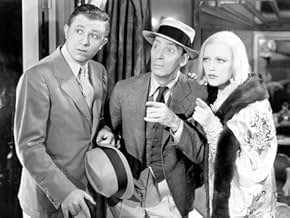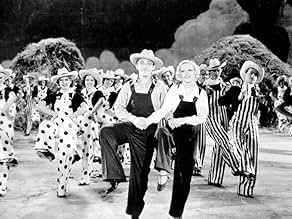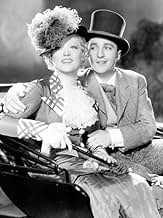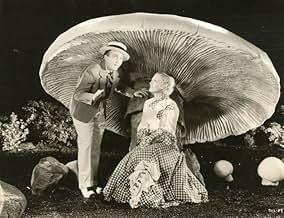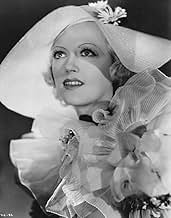AVALIAÇÃO DA IMDb
6,1/10
2 mil
SUA AVALIAÇÃO
Adicionar um enredo no seu idiomaA love-struck teacher pursues a radio singer to Hollywood.A love-struck teacher pursues a radio singer to Hollywood.A love-struck teacher pursues a radio singer to Hollywood.
- Direção
- Roteiristas
- Artistas
- Prêmios
- 3 vitórias e 1 indicação no total
The Radio Rogues
- The Radio Rogues
- (as Three Radio Rogues)
Sam Appel
- Mexican Bartender
- (não creditado)
Henry Armetta
- Henry Armetta
- (cenas de arquivo)
- (não creditado)
Eddie Bartell
- Member - Three Radio Rogues
- (não creditado)
Wallace Beery
- Wallace Beery - Premiere Clip
- (cenas de arquivo)
- (não creditado)
Clara Blandick
- Miss Perkins - Divinity Teacher
- (não creditado)
Harry Bowen
- Bartender
- (não creditado)
Nora Cecil
- Briarcroft's Teacher
- (não creditado)
Onest Conley
- Tap Dancer
- (não creditado)
Ken Darby
- Member - The King's Men
- (não creditado)
Jon Dodson
- Member - The King's Men
- (não creditado)
- Direção
- Roteiristas
- Elenco e equipe completos
- Produção, bilheteria e muito mais no IMDbPro
Avaliações em destaque
French teacher Sylvia Bruce (Marion Davies) teaches at an exclusive boarding school for girls where all of the other teachers are decades older than she is. She's restless and dissatisfied with her sterile environment. Then one night Sylvia turns on her radio and hears crooner Bill WIlliams (Bing Crosby) singing. He makes her feel alive again, so she packs her bags and leaves the school.
Sylvia ends up on the train to Hollywood that Bill is taking as he is going to make a movie. Not only does she tell Bill how much his singing meant to her, she declares her love for him. They don't know one another, they've never even met. The best way to describe her is a weird stalker character. Even though Bill has expressed dismay at her declaration and is obviously keeping company with the French actress of the film, Lili Yvonne (Fifi D'orsay), Sylvia still pursues him.
At first she gets a job as Lili's maid. When that doesn't work out she follows him to the studio and gets a job as an extra so she can get close to him that way. In the 21st century this would be a neo-noir with creepy music to match Sylvia's creepy behavior. I would bring up "Fatal Attraction" as a comparison, but at least there Michael Douglas was initially attracted to Glenn Close's character and did make the first move.
The plot is thin in this one - there's a pedestrian radio act inserted into the middle of the film that goes on interminably, probably just to pad the running time so it gets past an hour.
What's good about it? There are several great standards sung by Bing in top vocal form - "Beautiful Girl", "Temptation", and "Going Hollywood". Ned Sparks is great as an ascerbic director. Stu Erwin is the financial backer of the film who seems to be his normal passive self until he surprisingly finds his voice late. The production values are top notch - It's just that horrible plot!
I guess that in 1933, like now, wads of cash can cover a multitude of sins, and they sure covered William Randolph Hearst's sins in thinking he knew much about the art of motion picture making.
Sylvia ends up on the train to Hollywood that Bill is taking as he is going to make a movie. Not only does she tell Bill how much his singing meant to her, she declares her love for him. They don't know one another, they've never even met. The best way to describe her is a weird stalker character. Even though Bill has expressed dismay at her declaration and is obviously keeping company with the French actress of the film, Lili Yvonne (Fifi D'orsay), Sylvia still pursues him.
At first she gets a job as Lili's maid. When that doesn't work out she follows him to the studio and gets a job as an extra so she can get close to him that way. In the 21st century this would be a neo-noir with creepy music to match Sylvia's creepy behavior. I would bring up "Fatal Attraction" as a comparison, but at least there Michael Douglas was initially attracted to Glenn Close's character and did make the first move.
The plot is thin in this one - there's a pedestrian radio act inserted into the middle of the film that goes on interminably, probably just to pad the running time so it gets past an hour.
What's good about it? There are several great standards sung by Bing in top vocal form - "Beautiful Girl", "Temptation", and "Going Hollywood". Ned Sparks is great as an ascerbic director. Stu Erwin is the financial backer of the film who seems to be his normal passive self until he surprisingly finds his voice late. The production values are top notch - It's just that horrible plot!
I guess that in 1933, like now, wads of cash can cover a multitude of sins, and they sure covered William Randolph Hearst's sins in thinking he knew much about the art of motion picture making.
Sylvia Bruce (Marion Davies) is a bored French teacher but after hearing the melodious sounds of the famous Bill Williams (Bing Crosby) on the radio, she is so inspired she leaves her job and seeks her dream.
Going Hollywood is a rather odd movie as there is the disturbing fact that Marion Davies' character is practically a stalker who insists that their love is meant to be. I can usually accept the fact that it's just a movie - it doesn't have to be realistic, but I just felt her character was a bit of a nut case. I hate to say it but Davies is most unconvincing and it is almost painful to see her scenes. I was disappointed to see this because she was magnificent in silents. That being said, Marion is undoubtedly gorgeous and has a few good moments (and she's not a bad dancer too)... but not nearly enough as there should be.
It is evident that Bing Crosby and the music are the real stars of this picture. He steals every scene from Davies with effortless delivery. The music - especially "Temptation", "Going Hollywood" and "Beautiful Girl" are absolutely delightful little tunes and make the movie well worth watching.
Overall, a bizarre and often tedious movie and Davies isn't at her best. However handsome crooner Bing Crosby and the fantastic music by Arthur Freed and Herb Brown steal the show and make it watchable. Does not compare to the other musicals of this period.
Going Hollywood is a rather odd movie as there is the disturbing fact that Marion Davies' character is practically a stalker who insists that their love is meant to be. I can usually accept the fact that it's just a movie - it doesn't have to be realistic, but I just felt her character was a bit of a nut case. I hate to say it but Davies is most unconvincing and it is almost painful to see her scenes. I was disappointed to see this because she was magnificent in silents. That being said, Marion is undoubtedly gorgeous and has a few good moments (and she's not a bad dancer too)... but not nearly enough as there should be.
It is evident that Bing Crosby and the music are the real stars of this picture. He steals every scene from Davies with effortless delivery. The music - especially "Temptation", "Going Hollywood" and "Beautiful Girl" are absolutely delightful little tunes and make the movie well worth watching.
Overall, a bizarre and often tedious movie and Davies isn't at her best. However handsome crooner Bing Crosby and the fantastic music by Arthur Freed and Herb Brown steal the show and make it watchable. Does not compare to the other musicals of this period.
'Going Hollywood's' biggest attraction was Bing Crosby, who had one of the most beautiful and distinctive male (and in general) singing voices on film, as well as being a master of how to use it.
Crosby is certainly the best thing about 'Going Hollywood'. He seems relaxed, has a lot of charm and looks and sounds wonderful, his beautiful smooth voice used with impeccable phrasing and control as always. Great songs also helps, something that 'Going Hollywood' certainly has, the standouts being the title song, "Temptation" and "Beautiful Girl".
Of the production numbers, choreographically the best is the train station sequence which is so lively and entertaining. Although Raoul Walsh did seem a bit of an odd choice at first as director, often going for the tougher and darker edge to his films, but he does direct with a light touch without being too lightweight. Really enjoyed Patsy Kelly, who brings plenty of sass and allure. While going on a little too long, the Three Radio Rogues are also entertaining, and while overlong and overblown parts of the dream sequence are quite sweet.
However, was very much mixed on Marion Davies. She is attractive and does bring some charm and fun, but at other points she does look stiff and limitations in her singing and dancing show. Stuart Erwin has an appealing earnestness but has little to do, while Ned Sparks does smarmy well but the character is written with so little variation that it feels one-dimensional. Worst of all is Fifi D'Orsay, her character being an annoying cartoonish caricature made even more insufferable by that D'Orsay overacts to such a wild degree.
While some of the dream sequence was quite nice, the dancing scarecrows part does feel really bizarre and also jars. The bit with the blackface is neither cute or funny and even those who hardly ever scream racism will find it in bad taste. The script has some wit, but is also shallow and flaccid. The story while at first lively in pace constantly feels too convenient and too neatly wrapped up, while also dragging towards the end, having a premise and romance that rarely rings true and being paper thin. Characterisation is even thinner, development practically forgotten about.
All in all, many charms but also some big caveats. 5/10 Bethany Cox
Crosby is certainly the best thing about 'Going Hollywood'. He seems relaxed, has a lot of charm and looks and sounds wonderful, his beautiful smooth voice used with impeccable phrasing and control as always. Great songs also helps, something that 'Going Hollywood' certainly has, the standouts being the title song, "Temptation" and "Beautiful Girl".
Of the production numbers, choreographically the best is the train station sequence which is so lively and entertaining. Although Raoul Walsh did seem a bit of an odd choice at first as director, often going for the tougher and darker edge to his films, but he does direct with a light touch without being too lightweight. Really enjoyed Patsy Kelly, who brings plenty of sass and allure. While going on a little too long, the Three Radio Rogues are also entertaining, and while overlong and overblown parts of the dream sequence are quite sweet.
However, was very much mixed on Marion Davies. She is attractive and does bring some charm and fun, but at other points she does look stiff and limitations in her singing and dancing show. Stuart Erwin has an appealing earnestness but has little to do, while Ned Sparks does smarmy well but the character is written with so little variation that it feels one-dimensional. Worst of all is Fifi D'Orsay, her character being an annoying cartoonish caricature made even more insufferable by that D'Orsay overacts to such a wild degree.
While some of the dream sequence was quite nice, the dancing scarecrows part does feel really bizarre and also jars. The bit with the blackface is neither cute or funny and even those who hardly ever scream racism will find it in bad taste. The script has some wit, but is also shallow and flaccid. The story while at first lively in pace constantly feels too convenient and too neatly wrapped up, while also dragging towards the end, having a premise and romance that rarely rings true and being paper thin. Characterisation is even thinner, development practically forgotten about.
All in all, many charms but also some big caveats. 5/10 Bethany Cox
If you like to see the original crooner of all times and really the King of male singers. Bing was a great actor in this film along with super star Marion Davies, who was like the Marilyn Monroe during her days and even Jean Harlow. Marion Davies was also a long time friend of William Randolph Hearst, the newspaper magnet of California. Bing Crosby sings,"You were Temptation" and he must have charmed all the ladies hearts of those days. Wallace Berry, veteran actor has a brief role in this film and is uncredited along with the great Mae Clarke. This is really what Hollywood films were like in the Golden era of movies. It is a must view film.
I watched this movie because I wanted to see what Marion Davies could do in a comedy, which is supposedly what she did best. She was an attractive woman, with - at least on screen - a pleasant, unpretentious personality, so I figured she might indeed do well in comedy.
But this script, by the much admired David Ogden Stewart, gives her nothing to work with. She delivers her lines ok, but the lines are so uninteresting that I don't know what Helen Hayes could have done with them.
Davies has to dance, and she's passable but no better. But then, no worse than Crawford or some other actresses of the era who were given dance numbers. Davies has to sing, and again, she's not bad, but nothing special.
In short, this movie doesn't make a case for Davies as an actress in comedy. It doesn't make her look bad, but it doesn't make you think she was a great comedian, either.
For me, the best thing, the only really good thing, in this movie was Bing Crosby's delivery of some of his musical numbers, in particular *Temptation*, a great song that he brings off very well. The other musical numbers, like the script, are bland and forgettable.
I'm surprised that Hearst, with all his money and power, couldn't have seen to it that Davies had better material. But then, perhaps the problem was not with her but with him: maybe he couldn't tell if a movie script was good or bad and imposed bad ones on her.
But this script, by the much admired David Ogden Stewart, gives her nothing to work with. She delivers her lines ok, but the lines are so uninteresting that I don't know what Helen Hayes could have done with them.
Davies has to dance, and she's passable but no better. But then, no worse than Crawford or some other actresses of the era who were given dance numbers. Davies has to sing, and again, she's not bad, but nothing special.
In short, this movie doesn't make a case for Davies as an actress in comedy. It doesn't make her look bad, but it doesn't make you think she was a great comedian, either.
For me, the best thing, the only really good thing, in this movie was Bing Crosby's delivery of some of his musical numbers, in particular *Temptation*, a great song that he brings off very well. The other musical numbers, like the script, are bland and forgettable.
I'm surprised that Hearst, with all his money and power, couldn't have seen to it that Davies had better material. But then, perhaps the problem was not with her but with him: maybe he couldn't tell if a movie script was good or bad and imposed bad ones on her.
Você sabia?
- CuriosidadesWhen Marion Davies requested Bing Crosby as her leading man for this film, he was under contract to Paramount, where they had him starring in shorts and a series of college themed films with Jack Oakie. The success of this film moved Crosby into starring roles at Paramount with the likes of Carole Lombard and Miriam Hopkins, a definite step upwards.
- Citações
Bill 'Billy' Williams: [singing] Out where they say, "Let us be gay," I'm going Hollywood. I'll ballyhoo greetings to you, I'm going Hollywood. Hey, while you sleepyheads are in that hay, I'll be dancing - I'm gonna be dancing with a sun-kissed baby. And I'm on my way - here's my beret, I'm going Hollywood!
- ConexõesEdited into The Big Idea (1934)
- Trilhas sonorasGoing Hollywood
(1933) (uncredited)
Music by Nacio Herb Brown
Lyrics by Arthur Freed
Played during the opening credits
Sung by Bing Crosby at the railroad station
Played as background music twice
Principais escolhas
Faça login para avaliar e ver a lista de recomendações personalizadas
Detalhes
- Data de lançamento
- País de origem
- Central de atendimento oficial
- Idiomas
- Também conhecido como
- Going Hollywood
- Locações de filme
- Empresas de produção
- Consulte mais créditos da empresa na IMDbPro
Bilheteria
- Orçamento
- US$ 914.000 (estimativa)
- Tempo de duração
- 1 h 18 min(78 min)
- Cor
- Proporção
- 1.37 : 1
Contribua para esta página
Sugerir uma alteração ou adicionar conteúdo ausente

